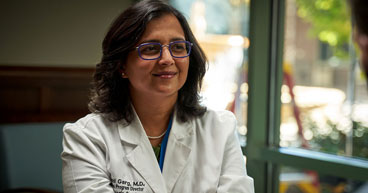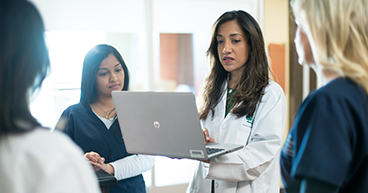
Cancer doesn’t go into remission for the holidays. It doesn’t go on Christmas vacation. But, sometimes, cancer doctors need to take time off. And when that happens, patients may feel anxious about what to do while their doctor is away.
In this article, we’ll explore:
- Why it’s important for doctors to take time off
- What happens when a doctor takes time off?
- What patients should do when their doctor is off
- When to go to the emergency room or urgent care
- Answers to questions patients may have when their doctor is off
If you’ve been diagnosed with cancer and would like to get a second opinion of your diagnosis or treatment options, call us or chat online with a member of our team.
Why it’s important for doctors to take time off
Study after study shows that medical professionals are among the most likely to experience occupational burnout—a heightened level of stress that makes it difficult for some professionals to continue in their jobs.
The World Health Organization describes burnout as having three distinct characteristics:
- Fatigue or exhaustion
- Cynicism, negativity or feeling distant
- Reduced effectiveness
Among those in the medical profession, oncologists and doctors dealing with cancer often battle burnout. Administrative demands, the burden of making life-or-death decisions and the emotional toll of losing patients are among the circumstances that may contribute to physician burnout.
“Being a physician is very relationship-oriented,” says Jeffrey Metts, MD, an Intake Physician and Chief of Staff at City of Hope® Cancer Center Atlanta. “We build relationships over time and those long-standing relationships have an impact on us. When you’re a physician, your patients are often like members of your extended family.
So, you appreciate the good moments, and you mourn the tough moments. You mourn a loss just like anyone else does.
“We can sometimes get overwhelmed because health care is never going to stop. So, by exiting and clearing your mind you can recharge those batteries. It just makes us that much stronger when we come back into our practice.”
What happens when a doctor takes time off?
Doctors’ schedules vary dramatically depending on their specialty, location and whether they are in private practice. Family physicians may mainly keep office hours, while some hospitalists may work seven straight days, followed by seven off.
Whether an oncologist or family physician, doctors always have a plan to ensure patients are covered when they are off or on vacation, says Anthony Perre MD, New Patient Intake Physician at City of Hope Atlanta.
“I would certainly let patients know that I'm going to be away, but they’re going to have the ability to speak to a very skilled physician while I’m gone,” says Dr. Perre, who was in private practice before joining City of Hope. “That doctor will be able to answer questions and take over their care in the interim if anything pops up. When I am away, I have 100 percent confidence that the physician filling in for me will be able to help my patients.”
What patients should do when their doctor is off
Patients can help themselves whether their doctor is away or not by being prepared and taking care of their health care tasks, such as making sure prescriptions are filled or re-filled, being current on regular visits and having upcoming visits scheduled.
“When a physician is gone or away patients can be a tremendous help to themselves if they are prepared for anything,” Dr. Metts says. “Let’s say your doctor is not just on vacation. Let's say your doctor relocates to another part of the country or retires and you have suddenly lost access to your own physician. You could encounter a situation where there isn't really good coverage. So, be prepared, in case the unexpected happens.”
When to go to the emergency room or urgent care
Sometimes it’s obvious when a patient is experiencing a medical emergency. In those cases, a trip to the emergency room is required—stat.
In other cases, only a visit to an urgent care or outpatient care center may be necessary.
If you have cancer, it’s best to ask your doctor what to expect before, during and after treatment to get a better sense of what might be an emergency or a normal side effect.
“Those are the things that you should ask your doctor,” Dr. Perre says. “What are the warning signs that you need to know so that if they arise you can get the care immediately rather than waiting.”
If your doctor is out of town, don’t wait for him or her to return before addressing a side effect or unexpected medical situation, Dr. Metts says. And don’t go to the doctor’s office during an emergency, he says. Go to an urgent care center or emergency room first.
“That actually has happened a handful of times in my career,” Dr. Metts says. “I got a call from a patient who was having stroke-like symptoms, and they wanted to know what to do. I said they should go to the nearest emergency department or call 911. They said, ‘No, I'm coming to you’ and then drove two to three hours to get to here because they had so much trust and belief in the people that have taken care of them before.
“Get the immediate emergency care that you need now,” he adds. “We can sort things out later once we once we rule out the life-threatening events that are right in front of you.”
Answers to questions patients may have when their doctor is off
Here are answers to some common questions about what to do and expect if your doctor is on vacation.
Do I need to see my oncologists before they go on leave?
Not necessarily. If you are up to date on your visits and future appointments and have had no unexpected events or side effects, you should be able to wait until your oncologist returns for your next scheduled visit.
How do I get medications refilled when my oncologist’s office is closed?
Whoever is filling in for your doctor has access to all your medical records and to your patient portal information. “In the world of electronic health records, the covering physician can readily see a person is due for medicine and can easily refill it, if necessary,” Dr. Perre says.
Who can answer questions about my imaging or lab results?
Reports on imaging and lab tests are usually available through the patient portal. If you have questions about your results, you can call the physician covering for your doctor or just wait until he or she returns.
What if my cancer symptoms worsen over the holidays?
If you have any concerns about worsening symptoms or side effects, call 911 if the situation is acute or go to the nearest emergency room or urgent care center.
Should I wait until after the holidays to resume my cancer treatment schedule?
“Not at all,” Dr. Perre says. “Especially with cancer. There’s definitely a benefit of staying on your schedule and continue your regimen on a timely manner without missing doses.”
If you’ve been diagnosed with cancer and would like to get a second opinion of your diagnosis or treatment options, call us or chat online with a member of our team.


